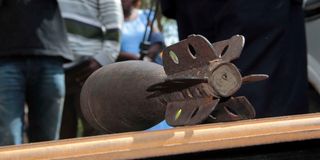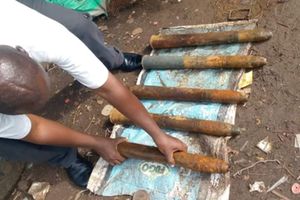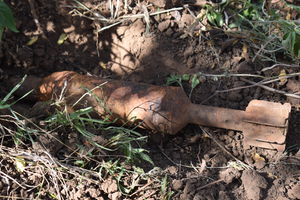An unexploded military mortar bomb.
For decades, treasure hunting has been perceived dangerous, but not for the hunters in the Heillu Manyatta area in Moyale sub-County.
Apart from the Hillo gold mines where hundreds of miners flocked in the pursuit of fortunes, Heillu Manyatta has also become a centre of excitement to many.
Mohammed Juma has been in the business of pursuing the treasures left behind in the Heillu Manyatta area.
“We were told tales about the Italians leaving behind treasures buried underground when they exited the region in the early 1900s perhaps after the Second World War,” Mr Juma said.
He has been in the business for years and has been lucky to discover items such as iron boxes and kettles among other antiques buried under the ground and prays that he hits it big one day.

An ancient mortar bomb.
He is motivated to continue with the hunt because of rumours that there were massive containers full of gold nuggets buried underground, possibly left behind by the colonialists with both amateur and professional treasure hunters camping in the region.
They do not merely believe that the settlers hid gold, mercury, precious metals and other valuable antiques but he can testify that a few hunters have recovered such items.
They use metal detectors to help them hunt for such treasures, and deploy excavators to dig it up. Some have even pitched camp in the region and installed their metal extractors in readiness for any spectacular finds.
The discovery of the 23 explosives 81 mm live mortar bombs in the area on April 19, 2025, gives a glimpse of an ongoing quest for the many hunters to hit big in their pursuits.
They were recovered by a group of treasure hunters in Heillu Manyatta in Moyale sub-County.
Bashun Barille Jarso is another treasure hunter who has been in the business for the last 8 months and hopes that he will one day hit a jackpot.
He was among the hunters who discovered the 23 mortar bombs.
He ventured into the business following the stories he was told by a community elder about treasures buried by colonialists around the area.
The elder also told him that the Gorumesa Hill around Moyale could possibly be not just an ordinary hill but a huge mound of soil whose beneath lie age-old treasures.
They are now calling upon the Ministry of Mining to intervene and help them with sophisticated tools that could hasten or ease their work.
Marsabit County Police Commander Leonard Kimaiyo confirmed the recovery of the explosives.
“We warn the residents against getting involved in such risky activities,” Mr Kimaiyo said.
The hunters did not immediately realise their potential danger until they were cautioned by a section of the residents.
Mr Kimaiyo explained that the mortar bombs could have been possible left behind by the colonialists, adding that police had taken custody of the explosives.
The Kenya Defense Forces officers from Odda military bases later took over to and are expected to send the explosives to the detectives for further ballistic examination.

A mortar bomb.
According to Ahmed Ali, one of the prominent treasure hunters in the Heillu Manyatta, the area is rich in the treasures that were left behind by the Italian colonialists.
He detailed how during the first Italo-Ethiopia war between 1895-1896 during the unsuccessful invasion of the Ethiopian empire (Abyssinia), Eritrea and Somaliland led to an establishment of a resistance base in Heillu Manyatta area in Moyale sub-County.
Between 1936 and 1941 the Italian colonies tried to make Ethiopia, Eritrea and Italian Somaliland (Somalia) their colonies in the Horn of Africa.
It is believed that some parts of Moyale sub-County were annexed to Ethiopia and considered part of the Africa Orientale Italiana whose reign was short-lived during the Second World War.
During the Second World War, Italian East Africa turned into a warzone of the East African Campaign.
In November 1841, the zones were occupied by a British-led force including colonial units and Ethiopian resistance fighters.
The then-Italian Somalia and Eritrea became part of the British administration while Ethiopia regained her independence in 1950.
Marsabit Botanic Garden Founder and CEO Guyo Roba told Daily Nation that foreign treasure hunters have been flying into the county and wooing the residents to help them locate the hidden treasures.
The foreigners have also been buying such recovered precious metals from the residents.
Some of the foreigners are experts on antique chandeliers, kettles and old iron boxes left behind by the colonialists, he said.
“Since 2023, we have seen some foreign experts visiting this county in search of hidden treasures and promising handsome amounts of money in return,” Mr Roba said.
Mr Roba who is a key environmental activist in the county has been in the forefront of calling for the certification of indigenous community-owned antiques.
He detailed that the certification would go a long way in ensuring just and fair-trade practices with any potential buyers.
The certification would also help prevent theft, biopiracy, and illegal trafficking of culturally prestigious items.
He has also been keen on promoting the preservation of indigenous knowledge to help maintain the communities’ livelihoods.
Further, certification helps with the documentation and protection of the originality and cultural importance of antiques and to prevent foreigners from profiting from them without the communities’ consent.
It also ensures that the indigenous communities receive their rightful compensation for their cultural heritage and to avert exploitations by potential traders.
A section of community elders strongly believe that Marsabit County could be having a lot of colonial-era bombs and military bunkers.











